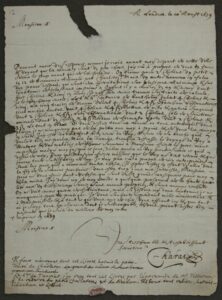
Wide Horizons: 17th Century French-British-Swiss Networks
Dr Vivienne Larminie explores 17th century Europeans’ wide horizons and extensive networks.

Letter from Moyse Charas to Bouhéreau
I arrived at Marsh’s Library to pursue my research on French-British-Swiss networks through the correspondence of Élie Bouhéreau (1643-1719), a French Huguenot doctor, forced to flee his native Rochelle in 1685, who became Marsh’s first Librarian in 1707. I was not disappointed.
The 1,200 letters demonstrate that French exiles maintained contact with each other and with international colleagues despite the unreliability of mail, but also reveal shared links and interests across national borders. In his letters to Bouhéreau, for example, the Huguenot apothecary Moyse Charas reveals that in 1679 he had a highly satisfactory audience with King Charles II in London. The letters to Bouhéreau from the physicist and councillor of the Genevan Republic Jean-Robert Chouet provide a window on scholarly circles and religious controversies in France and Switzerland.

Western door of Bern Cathedral
I was also able to spend time examining the library of Edward Stillingfleet (1635-1699) whose collection of 10,000 books was bought by Narcissus Marsh in 1705 as the foundational collection of Marsh’s Library. In Voyage de Suisse (1686), I read an account from two French refugees of their journey through Switzerland, apparently published to give co-religionists back in France a (mostly reassuring) sketch of what to expect should they take the same route into exile.
In Lausanne, the two men were impressed by the architecture and hill-top setting of the medieval cathedral, then in use for Protestant worship: there was nothing more magnificent to be seen.

French Church in Bern
In Bern, five or six months of nothing but ice and snow induced homesickness and depression. Going to the Cathedral of Bern, they were dubious about the figures carved around its doorway but charmed by psalms sung by beautiful voices and accompanied by sackbuts. The French church, which boasted a sober but eloquent pastor, was apparently packed with the best sort of people.
Dr Vivienne Larminie






